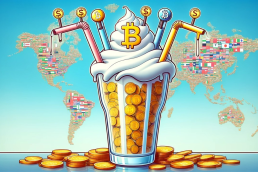Money is a tool we use to exchange goods and services, and banks help us keep it safe. But have you ever wondered why people sometimes rush to withdraw their money from banks all at once? This is called a bank run, and it happens because of a mix of psychology, uncertainty, and financial systems. In times of economic downturn, this risk becomes even more significant. Let’s break it down.
What is a bank run?
Imagine you hear rumors that your bank might be in trouble. You’re worried about losing your hard-earned money. But guess what? Many other people are hearing the same rumors, and they start thinking the same thing: “I need to get my money out before it’s too late!” This leads to a rush of people withdrawing their money from the bank, and this sudden demand can be overwhelming for the bank. Especially now that it can be done digitally, banks can collapse within hours..
Why do bank runs happen?
Bank runs are often triggered by fear and uncertainty. If people believe a bank might not be able to give them their money back, they rush to withdraw it just in case. But here’s the twist: banks don’t keep all the money you deposit. They lend most of it to others, hoping to earn interest and make a profit. This system usually works well, but if too many people want their money back all at once, the bank might not have enough physical cash & digital cash on hand. This can lead to a (bank) crisis.
This very situation occurred in both March and May of 2023 within the US banking system, triggered by depositors’ concerns that their banks had suffered significant losses by investing in Government Bonds (US treasuries), as these bonds’ prices had been considerably higher at the time of purchase compared to their current value. Consequently, the banks found themselves grappling with substantial unrealized losses, inciting widespread panic that prompted depositors to make rapid withdrawals.
Risk during economic downturns:
In tough economic times, like recessions, people get more worried about their financial security. They might hear news about businesses struggling, jobs being lost, and banks facing difficulties. This fear can trigger bank runs because everyone wants to secure their money when times are tough. But here’s the thing: if everyone rushes to the bank at once, it can actually cause the very problem they fear—banks running out of cash. This can make the economic situation worse.
Mitigating the risk:
So, what can you do to protect yourself and help prevent bank runs? First, stay informed. Understand the strength of your bank and the protections in place. Second, remember that banks are usually safe because governments have systems in place to prevent total collapse. And third, try not to make hasty decisions based on fear. If everyone acts calmly, the risk of a bank run decreases.
In conclusion, reduce counterparty risk!!
During times of economic crisis, the possibility of banks collapsing becomes apparent, showing how fragile financial systems can be. Past events have demonstrated that banks can fail quickly, which emphasizes the need to reduce risks linked to others in the financial system.
In uncertain times, assets like Gold and Bitcoin become important alternatives. These assets are not controlled by a single authority and have unique features that provide stability. Gold’s enduring value and Bitcoin’s limited supply offer ways to protect against problems in the financial world.
In summary, the chance of banks collapsing in economic crises highlights the importance of choosing assets with low risks from others. Gold and Bitcoin are strong options that are not affected by the challenges of regular financial systems.
Want to learn more about what it means to become a member of our community and be able to check out way more in depth content so you can learn how to benefit from the global transition that is taking place? https://cryptounseen.com/crypto-unseen-community
Want to learn more about “the Why, What & How of Bitcoin” sign up here for the free monthly training: https://cryptounseen.com/free-2-hour-training-about-the-why-what-how-of-bitcoin-crypto
Also, follow us on LinkedIn, Instagram and/or my personal Twitter here.
Subscribe to our free newsletter!
Marc
Meet Marc—with a unique history of studying psychology, poker, and performing sales on high levels, he eventually ended up with a curious eye for the world of money. He dove into traditional investing and even surfed the wild waves of "shitcoins" in the crypto space. But it was the wake-up call of the 2020 pandemic that really opened his eyes to the true power governments wield and how little control individuals have over their financial destiny. The broken fiat currencies within the traditional financial system and the rampant scams, lies, and rug-pulling in the crypto space lit a fire within him, driving his unwavering enthusiasm for 100% Bitcoin.
Fueled by this newfound awareness and his connection with a company called Awake Origins, Marc embarked on a remarkable spiritual journey, selling everything and traveling the globe with his family for nearly three years. Along the way, he couldn't help but ponder some big questions about money, economics, and global wealth disparities. These musings eventually led him to the fascinating world of Bitcoin, a place he's never looked back from. Today, Marc dedicates his time to helping folks and businesses seamlessly integrate Bitcoin into their daily lives, all while continuing his global adventures.


